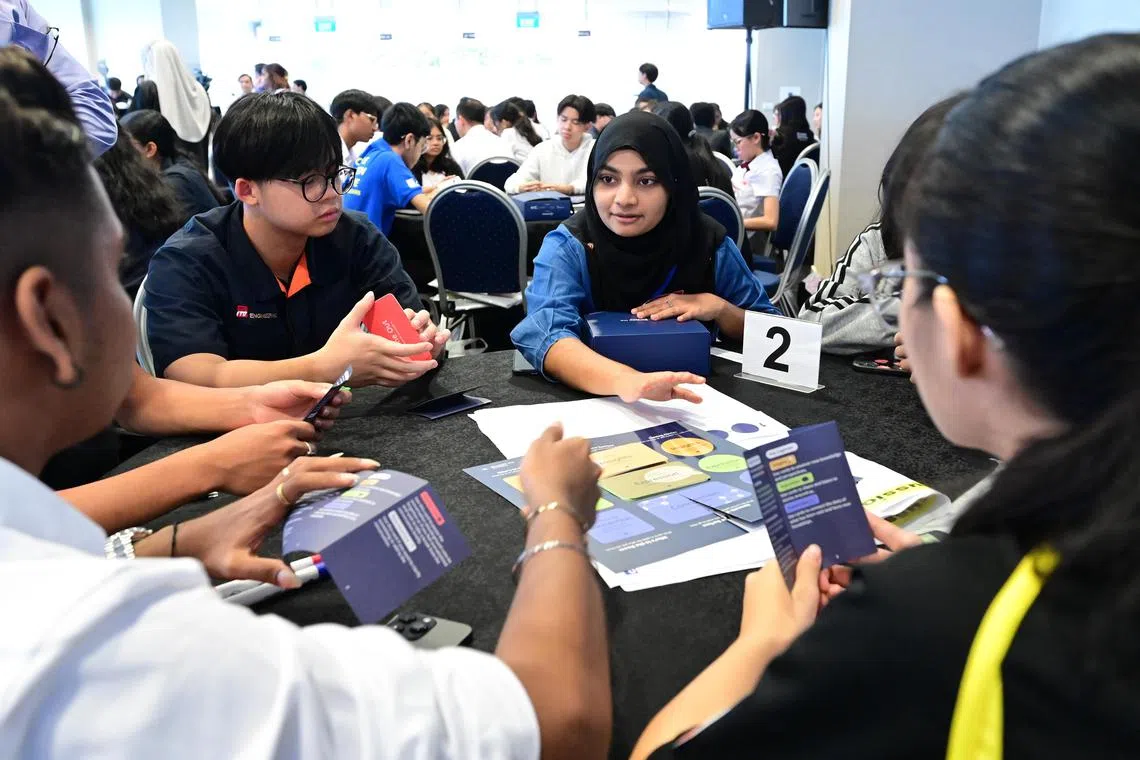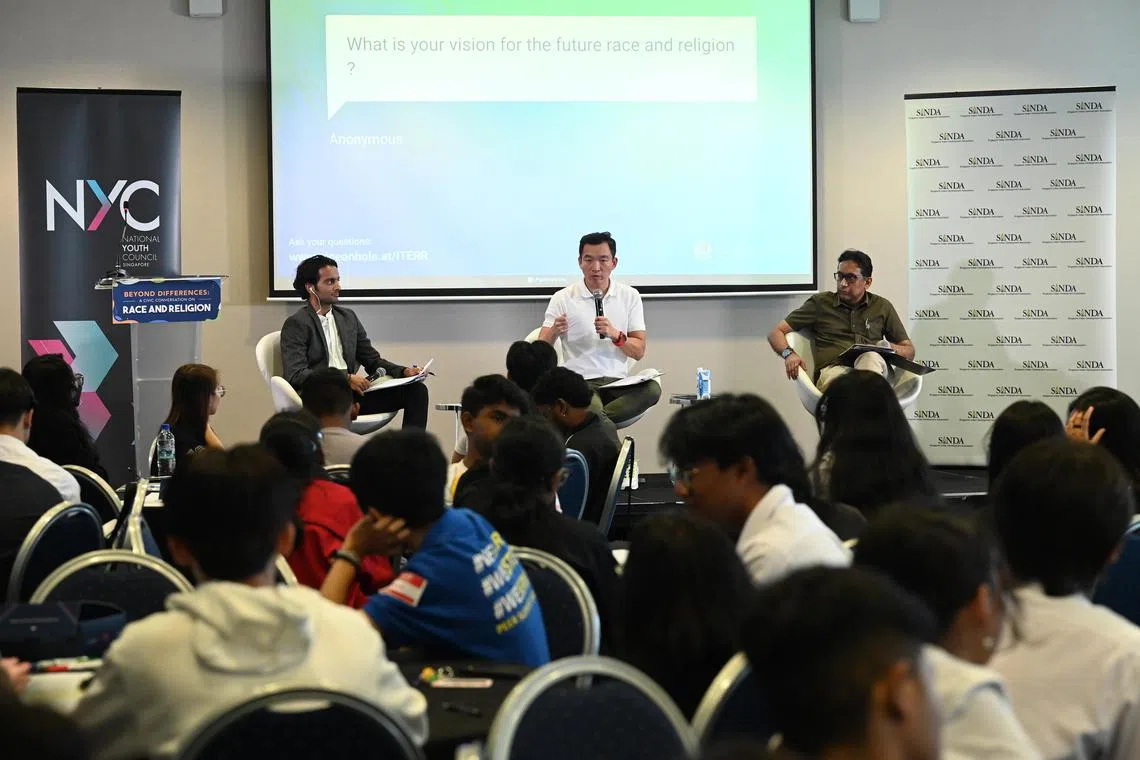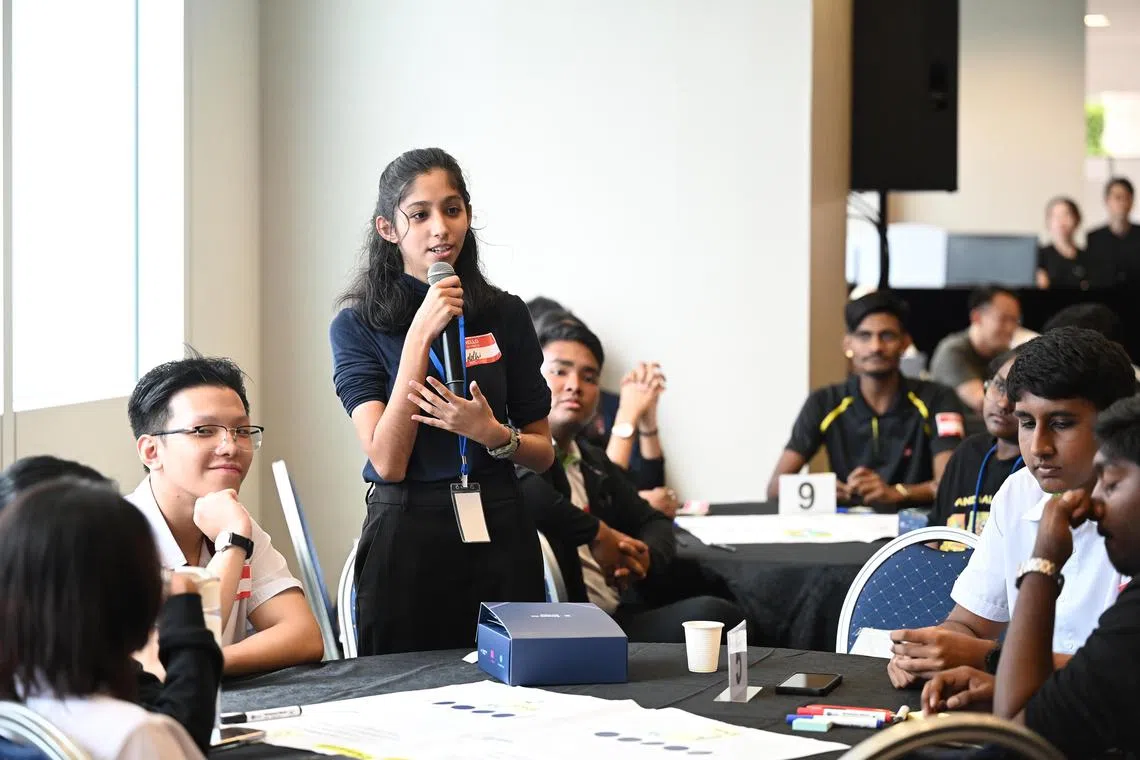New card game for youth to discuss local-foreign relations
Sign up now: Get ST's newsletters delivered to your inbox

Students discussing race and religion at ITE College Central using a civic conversation toolkit from the National Youth Council.
PHOTO: NATIONAL YOUTH COUNCIL
SINGAPORE - When a young woman was seeing a Chinese boy, she would often hear slurs like “Oh, your girlfriend is Indian?” She eventually split up with him as she felt it was an unhealthy environment for her to be in.
Another youth said that in her dating experience, she felt people looked down on her as she is Malaysian.
They were among 84 Institute of Technical Education (ITE) students who shared their experiences with racism on Friday.
The discussion on race and religion was held as part of Racial Harmony Month in July at ITE College Central. It was held according to Chatham House rules, under which participants are not named.
A panel discussion was also held with Mr Eric Chua, Senior Parliamentary Secretary for Culture, Community and Youth, and Mr Thambyrajah T., chief operating officer at the Singapore Indian Development Association (Sinda).
One participant said her Muslim cousin married a Christian woman and converted to the Christian faith. His parents were angry at first but accepted this over time. She said she hopes her own parents and older generations can be more open to interracial relationships.
Another participant said: “A lot about what makes a partner great is not even about their race.” Agreeing, another chimed in: “I think racism is taught – people are not born racist.”
Some participants shared racist jokes which they had heard, which often revolved around skin colour.
Mr Rizki Naufal Azhar, a visual communications student at ITE Central College, said of his discussion group: “We agree that we don’t really see the race of people, we see the person himself.”
The 19-year-old said the older generation might be more resistant to interracial relationships as they are unfamiliar with other cultures, but added that he hoped they might come to understand and embrace differences over time.
At the dialogue, Mr Chua announced a new civic conversation toolkit
He said young people may feel more comfortable discussing these topics anonymously online, but face-to-face conversations are also important as they allow for deeper conversations. He added that people may behave irresponsibly online and discussions can turn into echo chambers.

Mr Eric Chua, Senior Parliamentary Secretary for Culture, Community and Youth, and Mr Thambyrajah T, chief operating officer at the Singapore Indian Development Association (Sinda), during the discussion.
PHOTO: NATIONAL YOUTH COUNCIL
The new toolkit, the second in a series of three Civic Conversation resources, will be used at workshops with youth to facilitate conversations on local-foreign relations. It will be ready by the end of 2023.
The toolkit comprises a role-playing board game, and conversation cards encouraging young people to share their experiences and discuss myths and scenarios on local-foreigner relations in Singapore.
Friday’s session also included a workshop using NYC’s first Civic Conversations toolkit, called Beneath the Surface, to initiate discussions about race and religion.
These included questions on casual racism and interracial marriages, and scenarios such as a father being unhappy that his son has a girlfriend of another race, or a friend making a racist joke and calling those affected, sensitive.
Over 1,000 polytechnic students have attended these workshops since the toolkit was launched in November 2022. In the next two years, 2,000 more youth are expected to use the toolkits.
A 2022 NYC poll showed that even though half of local youth thought foreigners tend to stick to their own circles and expressed concerns over competition for career and educational opportunities, they agreed that foreigners add to Singapore’s cultural richness and economic competitiveness.
The poll was conducted with 700 Singaporean and foreign youth.

The discussion at ITE College Central on race and religion was held as part of Racial Harmony Month in July.
PHOTO: NATIONAL YOUTH COUNCIL
Singaporean youth have also grown more open towards other nationalities working or studying in the Republic.
According to the poll, close to seven in 10 youth agreed that Singapore should encourage people of other nationalities to work and study here, an increase from 2019 when six out of 10 shared this sentiment.
The workplace was the main source of interaction between local and foreign youth, where six in 10 had conversed with one another.
Getting to know locals through close friends was the second source of interaction for foreign youth.
For local youth, the neighbourhood was their second source of interaction with foreigners.
Over half of all the youth polled agreed that more interactions with one another would improve awareness of each other’s challenges and deepen community bonds.
Mr David Chua, chief executive of NYC, said survey data shows that youth who have foreign friends, or more opportunities to interact with foreigners, have a positive attitude towards local-foreigner relations.
“The Civic Conversation toolkit is an additional resource for both local and foreign youth to meaningfully engage one another in their desire to move beyond tolerance and deepen mutual appreciation and acceptance,” he said.


